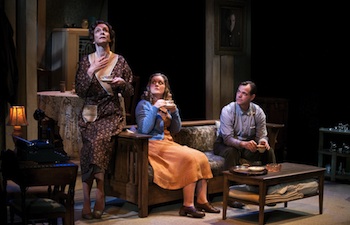
Toronto’s Soulpepper Theatre Company presents Tennessee Williams’ classic American tale of longing, disappointment and unfulfilled dreams, The Glass Menagerie at The Young Centre for the Performing Arts through September 10, 2011.
Written in 1946, The Glass Menagerie was Tennessee Williams’ breakthrough play and has since become one of the most prolific works of the American theatre. Soulpepper’s production of The Glass Menagerie is an exquisitely directed, beautifully acted and wonderfully designed tribute to the classic story.
Following up on their stunning production of Arthur Miller’s Death of a Salesman last year, Soulpepper is firmly establishing its reputation for brilliant interpretations of the classic works of the American theatre canon.
The play tells the story of faded southern belle turned overbearing mother Amanda Wingfield (Nancy Palk), her chronically listless son Tom (Stuart Hughes) and her staggeringly shy daughter Laura (Gemma James-Smith) as they prepare for the arrival of a “gentleman caller” (Jeff Lillico) whom Amanda has asked Tom to bring home as a suitor for Laura.
One of Williams’ key strengths as a playwright is his ability to write compelling characters that are complex, layered and nuanced. Under Ted Dykstra’s skillful direction, the actors in this Soulpepper production deliver exquisite performances that are every bit as layered and nuanced as the characters themselves.
Nancy Palk delivers a thoughtful, mature performance as Amanda, she perfectly balances Amanda’s overbearing qualities with her pathos. Even when she’s being meddlesome and suffocating to her children you can’t help but feel a pang of pity for her as she wistfully reminisces about the glory of her youth in the South.
Stuart Hughes beautifully channels Tom’s frustration and listlessness as well as his longing for the adventure he feels is just beyond his reach. His interactions with Palk as Amanda feel so authentic and compelling, whether they are at each other’s throats or playfully bantering, they are completely believable as mother and son.
I like the fact that Gemma James-Smith chooses to interpret Laura as more the awkwardly self-conscious girl rather than the pitifully shy “cripple”. Her deliberately awkward, stilted delivery of Laura’s lines often elicit laughter and I think it serves to further endear the character to the audience.
The Wingfields exist in their own microcosm in their apartment and their family life is so surreal that when Tom brings home a “gentleman caller,” Jim, as a potential suitor for Laura, his entry into the Wingfields’ universe is jarring. Jim is the antithesis to both Tom and Laura, he has direction in his life, he is self-assured and confident.
Jeff Lillico really emphasizes Jim’s confidence in a way that felt a bit over-the-top to me at times but that may well be a deliberate choice to emphasize the contrast between Jim and both Tom and Laura.
One of my favourite moments of the play is the intimate scene where Jim tries to establish a connection with the reclusive Laura. It takes places downstage and is entirely lit by candlelight. The absence of ambient stage lighting emphasizes the beautiful intimate quality of the interaction between the two characters.
The design elements further isolate the Wingfields into their own universe. Patrick Clark’s set design evokes a sort of purgatory. He frames the family’s small apartment with a series of windows and a wooden fire escape allows actors to exit through the auditorium and into the abyss.
Creighton Doane’s sound design furthers the isolating effect as the actors’ voices sometimes echo off into the distance for dramatic effect when they call out to each other.
Tennessee Williams describes The Glass Menagerie as a “memory play” where scenes are sketched as much through the invocation of impressions and sentiment. Fittingly, Lorenzo Savoini’s lighting design has an incandescent quality reminiscent of old sepia-toned photographs.
Tennessee Williams’ writing contains both depth and poetry. Though often performed, when consummate theatre artists who have an innate understanding of the characters interpret his scripts, the work can be elevated to the level of the sublime. Soulpepper’s production comes very close to achieving this nirvana.
Details:
- The Glass Menagerie by Tennessee Williams
- Directed by Ted Dykstra
- Performed by Stuart Hughes, Jeff Lillico, Nancy Palk & Gemma James-Smith
- Runs until September 10, 2011 at the Young Centre for the Performing Arts, located at 55 Mill Street, Building 49, in the Distillery Historic District.
- Tickets range from $28 – $65 (plus HST) and are available by calling the Young Centre box office at 416.866.8666 or by visiting www.soulpepper.ca.
- $22 tickets are available for 21-30 year-olds at www.stageplay.ca.
Photo credit:
– Nancy Palk, Gemma James-Smith, Stuart Hughes – Photo by Cylla von Tiedemann

… certainly many would probably agree that williams wrote, as you note above “complex, layered, nuanced” characters. what, i think, makes williams particularly unique though, is he was able to write characters, like laura, that come across as so genuinely traumatized by their own shame, by, perhaps, their own need — and failure — to be perfect. in other words, emotional pain. and particularly, women in emotional pain. … what williams does is he offers compassion for the laura’s of the world. it’s not saintly compassion — from a higher, forgiving force either. it’s in the form of another character who’s come aware of his own imperfections. but, still, all the same, it’s compassion tinged with so much hope. … i can think of so few playwrights that really pull that off, that humanity. … so, it’s nice to hear williams’ work is getting such a strong revival